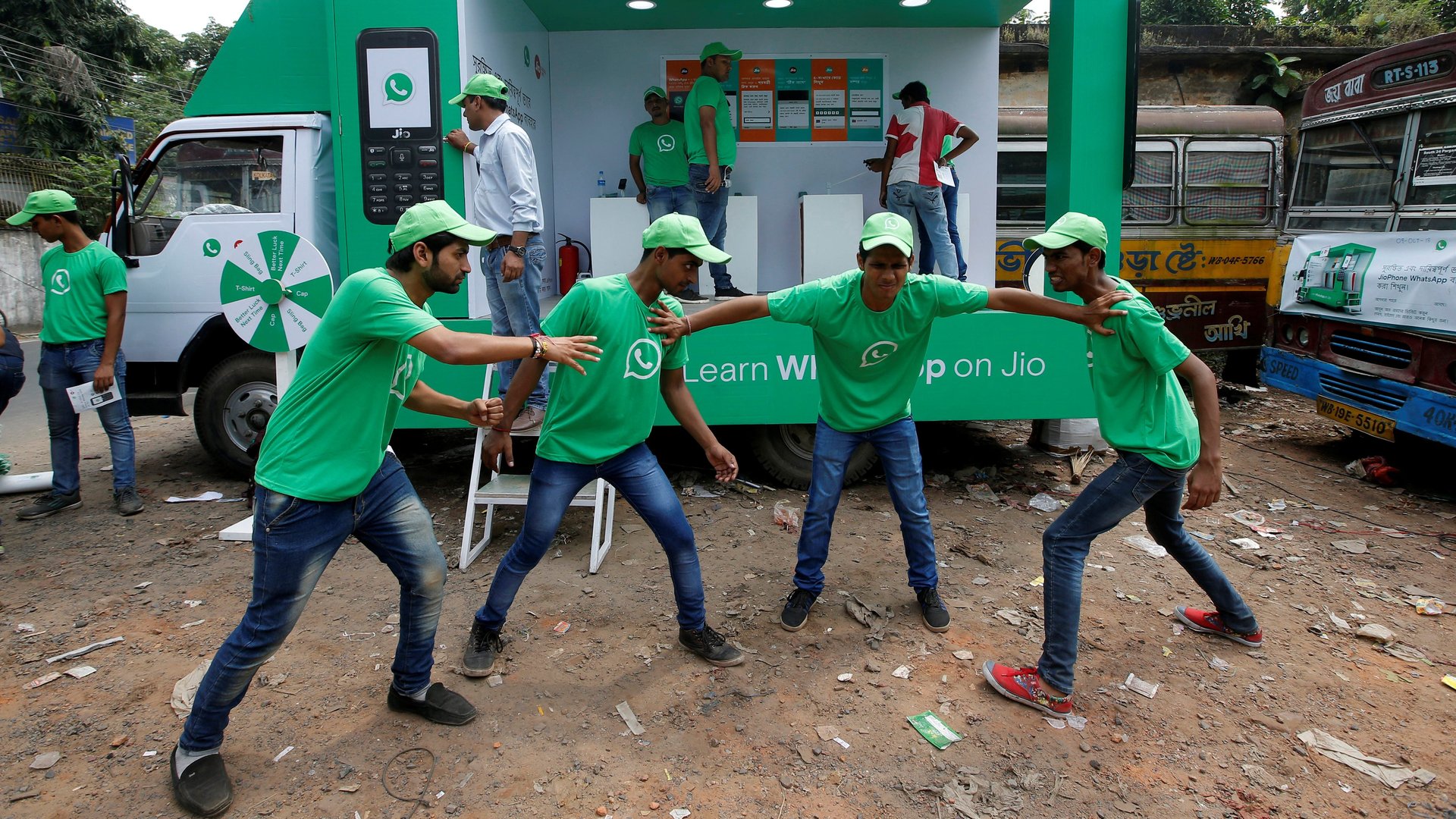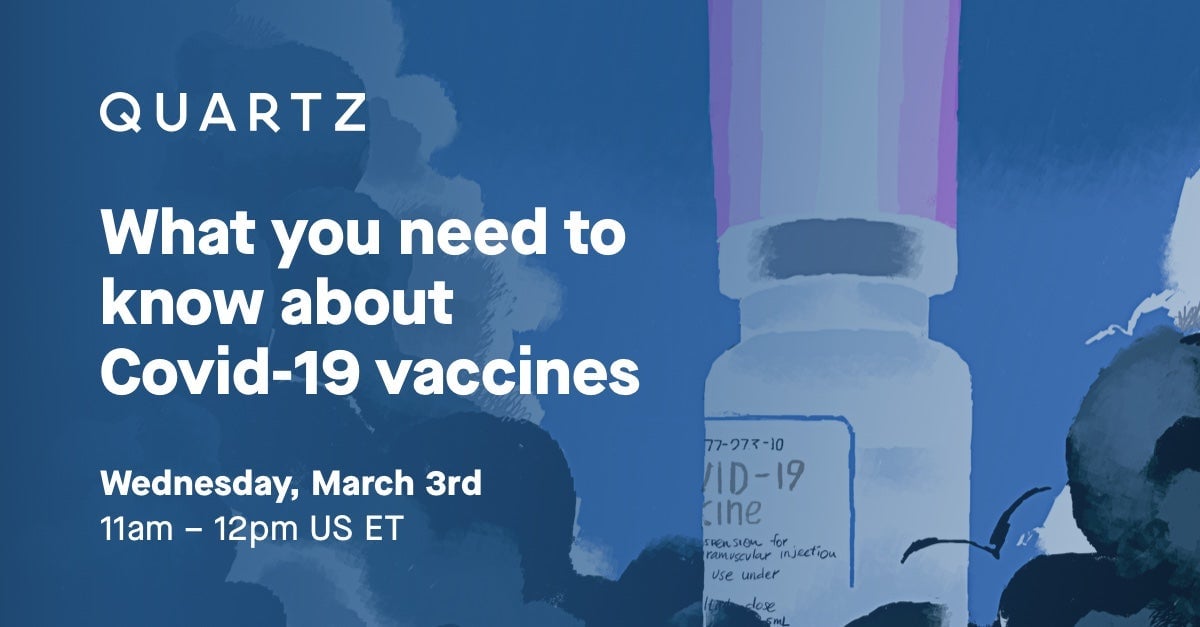US stimulus blow, Hong Kong protest manual, yellow penguin
Good morning, Quartz readers!


Good morning, Quartz readers!
Here’s what you need to know
The US stimulus package lost a crucial component. The Senate’s rule-keeper said a measure to raise the federal minimum wage to $15 by 2025 can’t be in the $1.9 trillion deal due to budgetary rules. The House will vote on its version of the bill today.
Dutch lawmakers called China’s actions against Uyghurs in Xinjiang a genocide. It is the first such formal recognition out of Europe, and comes days after Canada’s parliament reached the same conclusion.
India tightened the reins on social media and streaming. Effective immediately, services like Netflix will be asked to remove content deemed unlawful more quickly, while WhatsApp may be asked to break its encryption.
Europe’s expanded science and innovation fund wants your ideas. The €100 billion ($120 billion) Horizon Europe fund aims to finance “frontier” research over the next seven years, and increase support for turning applied research into goods and services.
Airbnb’s IPO was expensive. The $2.8 billion the company spent on stock compensation brought its quarterly loss to $3.9 billion.
ByteDance reached a $92 million privacy settlement. The deal in Illinois could end a series of class-action claims alleging that the company unlawfully collected the biometric data of teen TikTok users.
Two more vaccines were approved in China. Doses from CanSino Biologics and Wuhan Institute of Biological Products will join Sinovac and Sinopharm as the only Covid-19 vaccines available in mainland China.
What to watch for
The US Food and Drug Administration is on track to approve Johnson & Johnson’s vaccine sometime today, or possibly over the weekend, after releasing research on Wednesday that concluded the shot was effective.
It all happened in a little over a year. Here’s how it came together:
Jan. 2020: Johnson & Johnson receives the genetic sequence of SARS-CoV-2, the virus that causes Covid-19.
July 2020: Johnson & Johnson develops its single-shot Covid-19 vaccine candidate and begins early stage clinical trials.
Sept. 2020: The company begins its Phase 3 trial for its Covid-19 vaccine candidate with the goal of including up to 60,000 participants.
Jan. 29, 2021: Johnson & Johnson releases preliminary data about its Phase 3 clinical trial.
Feb. 4, 2021: The company submits its vaccine to the US Food and Drug Administration (FDA) for emergency use authorization.
Feb. 24, 2021: The FDA releases a 62-page review of the vaccine, which finds it safe and effective.
You ask about vaccines
What if we answered in real time?

Join us on Wednesday, March 3 at 11am ET for a free virtual event featuring Quartz science and health reporter Katherine Foley and Johns Hopkins Bayview Medical Center pulmonologist Panagis Galiatsatos. Will you still need to wear a mask? What if you get two different vaccines? We’ll cover all that and more.
Register in advance and send us any questions you’d like us to answer by clicking the button below. In the meantime, brush up on how immunity works. See you there!
Charting US Treasury yields
Investors in the $20 trillion US Treasury market tend to demand higher yields when they’re worried about inflation. That’s why it’s notable that interest rates on 10- and 30-year Treasury securities are back to or higher than they were before the pandemic.

The question is whether the US economy, already rebounding naturally as vaccines go into arms and people start spending their pent-up savings, overheats from heavy government support—and whether the Federal Reserve can contain inflation if it does.
Behind Hong Kong’s crowdsourced protest manual
“It’s like running a business. You need to find good people, you need to keep good people, you need to make them better people. You often need to find the resources, maybe it’s funding, cars, supplies. And they are fairly boring elements, I suppose. But they are precisely the thing that you need.”
“The HK19 Manual,” a crowdsourced archive of Hong Kong protesters’ know-how created to help future demonstrators, has already been partially translated into Burmese and widely shared among protesters in Myanmar, who are demonstrating against the Feb. 1 military coup. Mary Hui spoke with a key contributor about putting together the protest manual and the broader lessons about social movements.
✦ Get access to more exclusive QZ&A’s with the next generation of global leaders with a Quartz membership. Try it free for a week.
Surprising discoveries
Texans are getting a little help from afar. A New Jersey plumber heard about all the burst pipes, so he started driving.
Yellow penguins are real. A condition that prevents its feathers from making melanin gives this Antarctic bird its hue.
A “cruise missile type of thing.” One pilot flying over Kentucky saw something nobody can identify. It was really fast.
Covid can’t stop sumo in Japan. After most competitions were canceled, one veteran wrestler founded a tournament via video entry.
Plants give prisoner inmates a little peace. Their presence has been linked to lower levels of violence and self-harm.
Our best wishes for a productive day. Please send any news, comments, air sumo moves, and UFO sightings to [email protected]. Get the most out of Quartz by downloading our iOS app and becoming a member. Today’s Daily Brief was brought to you by Tripti Lahiri, Mary Hui, Katherine Ellen Foley, John Detrixhe, Jordan Lebeau, Susan Howson, and Liz Webber.